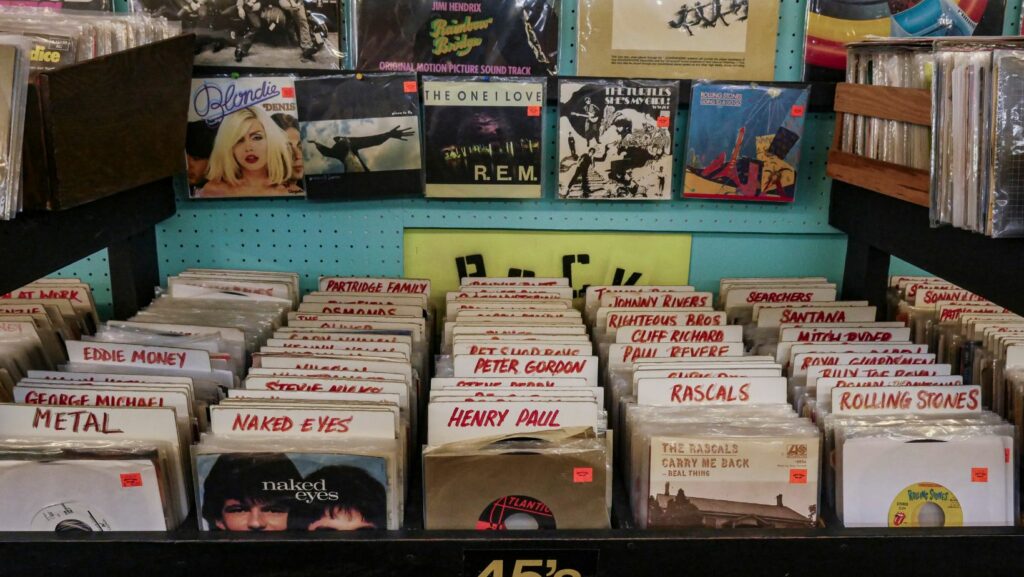Entertainment in the 1960s
- Cultural Transformation: The 1960s were defined by major cultural shifts, with entertainment reflecting the era’s tumult through music, television, and film.
- Music Revolution: Iconic artists like The Beatles and Elvis Presley dominated the music scene, while genres like rock ‘n’ roll and folk gained prominence, sparking social consciousness.

- Television Boom: Groundbreaking shows such as “The Twilight Zone” and “Star Trek” emerged, addressing critical social issues and advancing television storytelling.
- Film Innovations: Iconic films like “Easy Rider” and “The Graduate” challenged traditional narratives, paving the way for independent filmmaking and new storytelling techniques.
- Influential Figures: The decade produced notable musicians, actors, and directors who shaped the entertainment landscape and left a lasting legacy.
- Social Movements and Changing Norms: Key social movements sparked changes in norms and values, influencing the portrayal of diverse identities and challenging societal expectations in entertainment.
The 1960s marked a vibrant era of transformation in entertainment, reflecting the cultural upheavals and social movements of the time. From the rise of rock ‘n’ roll to the emergence of groundbreaking television shows, this decade captivated audiences and reshaped the landscape of popular culture. Icons like The Beatles and Elvis Presley became household names, while films like “Easy Rider” challenged conventional storytelling.
Television also underwent a revolution, introducing innovative formats and diverse programming that resonated with a generation eager for change. Shows like “The Twilight Zone” and “Star Trek” not only entertained but also explored complex themes of identity and morality. As the world grappled with significant events, the entertainment of the 1960s served as a powerful reflection of society’s hopes, fears, and aspirations, leaving an indelible mark that continues to influence today’s culture.
Overview Of Entertainment In The 1960s
Entertainment in the 1960s showcased significant transformation driven by cultural shifts and social movements. Rock ‘n’ roll surged in popularity, with influential figures like The Beatles and Elvis Presley dominating the music scene. These artists not only captivated audiences but also became symbols of youth rebellion and changing social norms.
Television during this decade also experienced a notable evolution. Innovative shows like “The Twilight Zone” and “Star Trek” enriched the medium by addressing complex themes, such as morality, identity, and the future of humanity. These programs attracted diverse viewership and ignited discussions around pressing societal issues.
Hollywood cinema adapted to the changing landscape, introducing films that reflected the tumultuous spirit of the times. Movies like “Easy Rider” and “The Graduate” resonated with young audiences, often portraying countercultural narratives and challenging traditional values. The rise of independent filmmakers further diversified the cinematic landscape, contributing to the era’s cultural richness.
The 1960s also saw a flourishing of live performances and festivals. Events like Woodstock in 1969 became pivotal moments in music history, uniting thousands under a common countercultural banner. This festival marked a shift toward collective experiences, emphasizing peace, love, and the spirit of the era.
Overall, entertainment in the 1960s mirrored the vibrant, often turbulent, nature of society. The decade left an indelible mark that continues to influence contemporary culture, music, television, and film.
Key Genres And Trends
The 1960s showcased key genres and trends that revolutionized entertainment. This decade made significant contributions, shaping cultural identities and enhancing artistic expressions across various mediums.
Music Revolution
Music in the 1960s underwent a dramatic transformation. Rock ‘n’ roll emerged as a dominant genre, with influential bands and artists like The Beatles, The Rolling Stones, and Bob Dylan reshaping musical landscapes. The British Invasion marked a pivotal moment as British bands gained immense popularity in the United States. Folk music also gained traction, with artists like Joan Baez and Peter, Paul and Mary addressing social issues through their lyrics. Psychedelic rock, characterized by experimental sounds and themes, gained prominence with bands like Jefferson Airplane and The Grateful Dead. Music festivals, especially Woodstock in 1969, epitomized the era’s spirit of unity, love, and rebellion.
Television Boom
Television experienced remarkable growth during the 1960s, becoming a key source of entertainment. Numerous groundbreaking shows emerged, addressing contemporary issues and popular culture. Programs such as “The Twilight Zone” introduced viewers to thought-provoking narratives, while “Star Trek” explored complex themes of diversity and exploration. Sitcoms like “The Dick Van Dyke Show” and “I Love Lucy” provided humor amidst societal changes. The decade saw the rise of color television, enhancing the visual experience. Television became an essential medium for advertising and influencing public opinion, reflecting societal shifts and cultural trends.
Film Innovations
Film innovations in the 1960s redefined storytelling in cinema. Independent filmmakers emerged, challenging mainstream narratives and delivering unique perspectives. Influential films like “Easy Rider” and “The Graduate” highlighted countercultural themes and resonated with youth audiences. The emergence of New Hollywood brought a shift in filmmaking techniques, with an emphasis on realism and character-driven narratives. Directors like Francis Ford Coppola and Martin Scorsese played crucial roles in this transformation. The decade also introduced experimental films that pushed artistic boundaries, fostering creativity in the industry. Overall, film reflected and shaped the social fabric of the era, making a lasting impact on future generations.
Influential Figures
The 1960s produced numerous influential figures across music, film, and television. These individuals shaped the cultural landscape and defined the entertainment of the era.
Musicians
Musicians played a vital role in the 1960s entertainment scene.
- The Beatles: Revolutionized pop music with their innovative sound and lyrics, becoming global icons. Their albums, like Sgt. Pepper’s Lonely Hearts Club Band, transformed music production and aesthetics.
- Elvis Presley: Continued to dominate the rock ‘n’ roll genre, blending various musical styles and energizing youth culture with his performances.
- Bob Dylan: Redefined folk music, incorporating social and political themes in songs like “Blowin’ in the Wind,” influencing countless artists.
- Jimi Hendrix: Pioneered electric guitar techniques, merging rock and blues to create a distinctive sound that pushed musical boundaries.
Actors And Actresses
The film industry showcased remarkable talent among actors and actresses who influenced public consciousness.
- Audrey Hepburn: Starred in iconic films such as Breakfast at Tiffany’s, embodying style and grace while addressing themes of love and personal freedom.
- Paul Newman: Gained fame in films like Cool Hand Luke, portraying complex characters that resonated with audiences and challenged societal norms.
- Jane Fonda: Emerged as both an actress and activist, leveraging her fame to advocate for social causes, notably in films like They Shoot Horses, Don’t They?
- Marilyn Monroe: Although her career peaked earlier, her influence lingered, symbolizing glamour and tragedy in Hollywood.
Directors
Directors in the 1960s redefined cinematic storytelling and visual style.
- Stanley Kubrick: Known for masterpieces like 2001: A Space Odyssey, Kubrick pushed the boundaries of film narrative and technology, establishing new cinematic vocabulary.
- Arthur Penn: Directed Bonnie and Clyde, a film that broke conventions and reflected the counterculture of the time, altering Hollywood’s approach to storytelling.
- Mike Nichols: Made an impact with The Graduate, which captured the disillusionment of youth and presented nuanced characters, appealing to a new generation.
- Francois Truffaut: As a key figure in the French New Wave, Truffaut’s innovative techniques encouraged filmmakers to explore personal narratives and realism.
This decade’s influential figures altered the entertainment industry, leaving a legacy that continues to resonate today.
Cultural Impact
The 1960s produced a profound cultural impact, characterized by significant social movements and evolving norms and values. This era reshaped entertainment, inspiring audiences and reflecting the transformative social landscape.
Social Movements
Social movements significantly influenced the entertainment landscape of the 1960s. Civil rights activism championed equality and justice, prompting artists to address systemic inequality through music and film. Songs like “Fight the Power” by The Isley Brothers resonated with the struggle for civil rights, while documentaries showcased the brutality of segregation. The anti-war movement also played a crucial role, inspiring musicians such as Joe Cocker and Creedence Clearwater Revival to voice dissent against the Vietnam War. Public protests and artistic expressions amplified the urgency of social change, fostering solidarity and awareness among diverse communities.
Changing Norms And Values
 Changing norms and values marked the 1960s as a pivotal time of cultural evolution. Traditional viewpoints faced challenges, leading to shifts in social attitudes regarding family, gender roles, and sexuality. The portrayal of women in entertainment evolved with television shows like “The Mary Tyler Moore Show,” which presented independent female characters pursuing careers. Furthermore, rock music became a vehicle for exploring themes of love, rebellion, and identity, allowing artists to question societal expectations. This era’s embrace of counterculture and alternative lifestyles encouraged new forms of expression and personal freedom. The impact of these changes continues to resonate, shaping contemporary cultural dynamics.
Changing norms and values marked the 1960s as a pivotal time of cultural evolution. Traditional viewpoints faced challenges, leading to shifts in social attitudes regarding family, gender roles, and sexuality. The portrayal of women in entertainment evolved with television shows like “The Mary Tyler Moore Show,” which presented independent female characters pursuing careers. Furthermore, rock music became a vehicle for exploring themes of love, rebellion, and identity, allowing artists to question societal expectations. This era’s embrace of counterculture and alternative lifestyles encouraged new forms of expression and personal freedom. The impact of these changes continues to resonate, shaping contemporary cultural dynamics.
Driving Change and Fostering Connection
The entertainment landscape of the 1960s was a powerful reflection of a society in flux. As artists and creators broke boundaries they not only entertained but also sparked critical conversations about identity and social justice. This decade laid the groundwork for future generations in music film and television.
The cultural shifts witnessed during this time continue to resonate today influencing modern entertainment and shaping societal values. From the rise of iconic musicians to groundbreaking television shows and films the 1960s left an indelible mark that still inspires creativity and activism. This era’s legacy is a testament to the enduring power of art in driving change and fostering connection.



